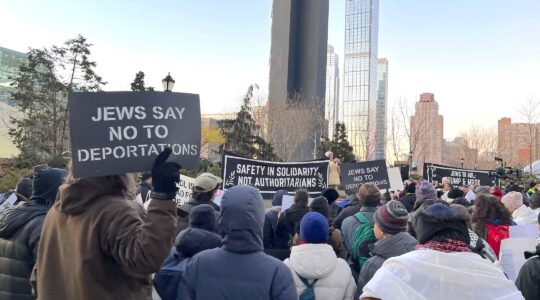One prominent mainline Protestant church’s vote last week against divestment from Israel may influence another church to defeat a similar divestment resolution next month, according to a leader of the anti-divestment campaign.
Mark Tooley, president of the Washington, D.C.-based Institute on Religion and Democracy, a conservative research institute affiliated with the Methodist Church, said the General Conference of the United Methodist Church’s defeat of two motions to divest from three U.S. companies that operate in the West Bank make it likely that the Presbyterian Church will also vote against divestment at its upcoming national conference.
The Presbyterians’ 220th General Assembly will take place June 30-July 7 in Pittsburgh.
“There will be spillover,” Tooley told The Jewish Week in a telephone interview this week. The Presbyterians “would not want to be the only major American denomination” of Christianity to adopt a pro-divestment resolution, said Tooley, who attended the General Conference and lobbied against the divestment resolution. He cited several American church groups that have defeated divestment proposals during the last decade.
The most recent vote came last week in Tampa during the Methodists’ national convention. By a 2-to-1 vote, delegates to the gathering of the nation’s largest mainline Protestant denomination defeated a move to divest from Motorola Solutions, Hewlett-Packard and Caterpillar. (Delegates did, however, endorse a targeted boycott of Israeli goods made in West Bank settlements.)
They also voted against measures that would reintroduce a divestment resolution and that would single out Israeli behavior for criticism.
The latter resolution, reflecting “leftover Liberation Theology of the 1970s and 1980s,” presented “a very distorted picture” of the Middle East, ignoring human rights abuses in other countries in the region, Tooley said.
He called months of lobbying in favor of the divestment resolution by Palestinian Christians, some of whom spoke at the General Conference, “a big flop.” Besides a minority of “U.S. liberals” in the Church, most of the delegates, including those with an Evangelical bent, support Israel, Tooley said.
Rev. Alex Joyner, who opposes divestment as spokesman for United Methodists for Conservative Peacemaking in Israel and Palestine, called last week’s vote “a clear endorsement” of his organization’s stance. He said his organization “encourag[ed] the more productive approach of negotiations and positive investments.”
“A lot of the same forces” that led to the divestment resolutions’ defeat last week “are at work in the other denominations,” Rev. Joyner said, but he was reluctant to predict what effect his church’s vote might have on the Presbyterians’ vote on a divestment resolution.
Requests for comment on this issue from several leaders of the pro-divestment movement in the Methodist Church were not returned by Jewish Week deadline.
Rabbi Steve Gutow, president of the Jewish Council for Public Affairs, has coordinated the Jewish community’s lobbying efforts against divestment resolutions.
“The rejection of divestment is a welcome outcome and a relief to me and the over 1,200 American rabbis who signed an unprecedented letter to Church delegates offering partnership in peacemaking and warning that divestment would undermine ongoing efforts for peace and damage interfaith relations,” he said in a prepared statement.
“We applaud the decision of the Methodist Church not to make divestment their guiding principle on how to engage with Israel,” said David Sherman, chairman of Chicago’s Jewish Community Relations Council, who worked with delegates to defeat the Methodist resolution. “[We] hope that other divestment initiatives being considered in other Christian denominations will similarly be defeated,” he said.
The divestment resolutions are part of the wider boycott, divestment and sanctions (BDS) movement that seeks to delegitimize and financially hurt Israel.
Critics of Israel did achieve limited success at the gathering; several regional churches decided independently to divest from the trio of firms. Delegates approved a petition that calls for opposition to Israeli settlements on Palestinian land through nonviolent responses, but did not mention specific responses.
The PalestineChronicle.com website this week criticized the Methodists’ vote, calling Israel guilty of “the most incendiary human right abuses and colonial crimes of our time,” and comparing Israel’s security fence along the West Bank border to the wall “that one encircled the Warsaw ghetto.”
Ethan Felson, JCPA vice president, said it is too early to guess if the Presbyterian convention will accept its divestment resolution. “I’m not betting now.”
But Mark Tooley of the Institute on Religion and Democracy said a likely Presbyterian defeat of the measure will probably end such resolutions’ considerations by major U.S. churches for the near future. “If the Presbyterians vote against it … where else can it go?”
E-mail: steve@jewishweek.org
The New York Jewish Week brings you the stories behind the headlines, keeping you connected to Jewish life in New York. Help sustain the reporting you trust by donating today.




